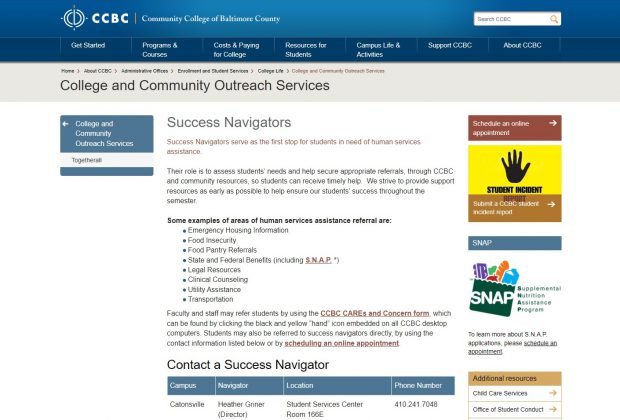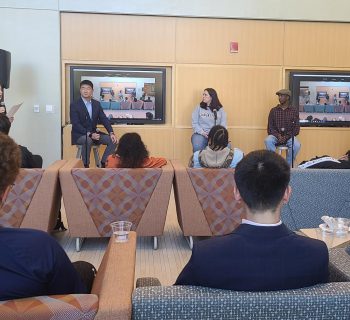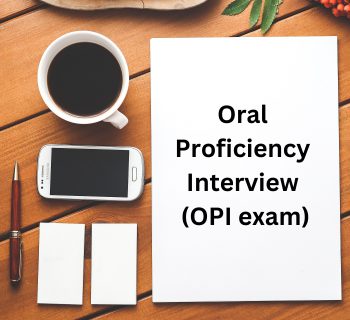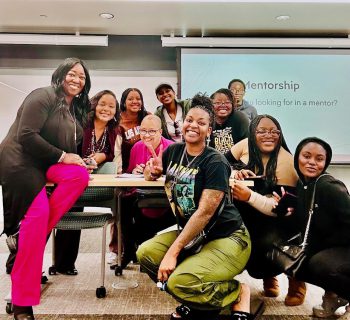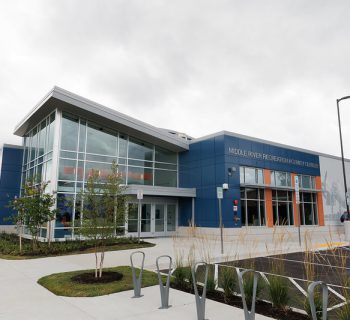Jason Wilkinson
At some point in everyone’s life, they need help, and there shouldn’t be any shame in having to ask for it. At CCBC, students in need can reach out to College and Community Outreach Services for help with a number of issues to receive the assistance they need.
“We provide outreach services by connecting students to resources in the community,” said Jaleesa Thomas, a Success Navigator who has worked in College and Community Outreach Services for three years. They can help students secure referrals for a lot of wide-ranging issues such as SNAP (Supplemental Nutrition Assistance Program), bus passes, counseling services, eviction prevention, food pantries, and much more.
“I think our office is benefitting students because they are able to stay enrolled, but also that we help the Baltimore area in general, helping families be successful,” said College and Community Outreach Services Director Dr. Heather Griner, who has been with the department since its inception eight years ago.
According to a 2023 study by the National Postsecondary Student Aid Study (NPSAS), “Overall, 23% of undergraduates, and 12% of graduate students, are experiencing food insecurity. This means more than 4 million students are food insecure. And eight percent of undergraduate and 5% of graduate students are experiencing homelessness, translating to more than 1.5 million students.”
Food insecurity is an issue that has a large effect on student graduation rates. According to a study published in Public Health Nutrition, only 44% of food-insecure students finished their undergraduate degrees compared to 68% of students who were food-secure. For a food-insecure student, receiving a referral to a food pantry or SNAP can be the thing that helps keep them enrolled and on their way to completing their degree.
“There is no typical appointment,” said Dr. Griner. “We meet students where they are at. Each appointment is different. Students can be referred by their instructor, staff, self-referral or a walk-in.”
Transportation is another issue that poses a lot of challenges to students. According to the College Board, 87% of first-year students live off-campus and will spend an average of $1,840 on transportation alone. For many students, this is a struggle. Lack of reliable transportation can not only lead to tardiness, but a plethora of additional stressors as well that can affect a student’s focus. This is why a bus pass could prove to be so essential.
“Essentially, we try to help students be successful in their classes by helping with non-academic needs,” said Dr. Griner.
When a student is focused on issues in their personal lives such as food-insecurity, transportation, and bills, it can deeply affect their mental health and it is nearly impossible to not carry that into the classroom. According to a 2022 study by Boston University, mental health issues among students increased steadily between 2013 and 2021.
In a survey conducted by Intelligent.com, they found that over 70% of students struggled with their mental health and over 40% of students considered dropping out of school because of their mental health. Of all of the students surveyed that were dealing with mental health issues, 18% said their struggles were new, while 82% said that they experienced mental health issues before college, with the majority of students who experienced mental health issues prior to college saying that they were struggling more after starting college.
For students experiencing mental health issues, College and Community Outreach Services can assist them with receiving counseling. “Students can have virtual or in person spots where we discuss their needs and connect them to the appropriate resources,” said Thomas.
If you or a student you know are struggling with anything, please feel free to reach out to a Success Navigator. You can find more information at the link below:


